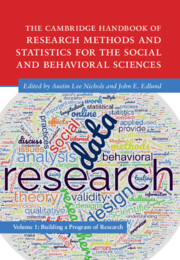 The Cambridge Handbook of Research Methods and Statistics for the Social and Behavioral Sciences
The Cambridge Handbook of Research Methods and Statistics for the Social and Behavioral Sciences from Part IV - Statistical Approaches
Published online by Cambridge University Press: 25 May 2023
This chapter provides a brief introduction to multilevel models, specifically organizational models, and should be accessible to researchers who are familiar with ordinary least-squares (OLS) regression (i.e., multiple regression models). OLS regression assumes independence of observations; however, the responses of people clustered within organizational units (e.g., schools, classrooms, hospitals, companies) are likely to exhibit some degree of relatedness. In such scenarios, violating the assumption of independence produces incorrect standard errors that are smaller than they should be – multilevel modeling can alleviate this concern. However, the advantages of multilevel modeling are not purely statistical. Substantively, researchers may seek to understand the degree to which people from the same cluster are similar to each other and identify variables that predict variability within and across clusters. Multilevel analyses allow us to exploit the information in clustered samples and partition variance in the outcome variable into between-cluster and within-cluster variability. We can also use predictors at both the individual (level 1) and group (level 2) levels to explain this between- and within-cluster outcome variance.
To save this book to your Kindle, first ensure [email protected] is added to your Approved Personal Document E-mail List under your Personal Document Settings on the Manage Your Content and Devices page of your Amazon account. Then enter the ‘name’ part of your Kindle email address below. Find out more about saving to your Kindle.
Note you can select to save to either the @free.kindle.com or @kindle.com variations. ‘@free.kindle.com’ emails are free but can only be saved to your device when it is connected to wi-fi. ‘@kindle.com’ emails can be delivered even when you are not connected to wi-fi, but note that service fees apply.
Find out more about the Kindle Personal Document Service.
To save content items to your account, please confirm that you agree to abide by our usage policies. If this is the first time you use this feature, you will be asked to authorise Cambridge Core to connect with your account. Find out more about saving content to Dropbox.
To save content items to your account, please confirm that you agree to abide by our usage policies. If this is the first time you use this feature, you will be asked to authorise Cambridge Core to connect with your account. Find out more about saving content to Google Drive.